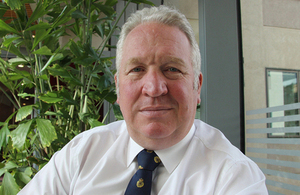Proposals for further emergency services collaboration announced
Consultation to look at transforming the way the police, fire service and ambulance service work together

Minister for Policing, Crime, Criminal Justice and Victims, Mike Penning
Radical proposals to transform the way the police, fire and rescue and ambulance services work together were unveiled by the Prime Minister today (Friday, 11 September).
The Government has already invested over £70 million in collaboration projects and local areas have shown the benefits of joint-working between the emergency services – but there is more to be done to improve the way they serve communities, cut crime, save lives and provide value for money for taxpayers.
The measures included in a consultation paper published today are:
-
Encouraging collaboration by introducing a new statutory duty on all three emergency services to look at opportunities to work with one another better to improve efficiency and effectiveness.
-
Enabling police and crime commissioners (PCCs) to take on the duties and responsibilities of fire and rescue authorities (FRAs), where a local case is made.
-
Where a PCC takes on the responsibilities of a FRA, allowing them to create a single employer for police and fire staff so it is easier for them to share back office functions and streamline management.
-
Enabling a PCC to be represented on their local FRA in areas where they do not take on the responsibility for fire and rescue services.
-
Abolishing the London Fire and Emergency Planning Authority and giving the Mayor or London direct responsibility for the fire and rescue service in London, as will be the case for the new Mayor of Greater Manchester.
-
Improving joint working between PCCs and NHS ambulance foundation trusts by encouraging trusts to consider PCC representation on their council of governors.
Important distinction
The proposals do not alter the important distinction between operational policing and firefighting. The law preventing a member of a police force from being a firefighter will remain in place and there is no intention to give firefighters the power of arrest.
Central government funding for the two organisations will continue to remain separate, as will council tax precepts, maintaining transparency for local taxpayers about how their taxes are spent on local services.
Minister for Policing, Crime, Criminal Justice and Victims, Mike Penning, said:
It simply doesn’t make sense for emergency services to have different premises, different back offices and different IT systems when their work is so closely related and they often share the same boundaries.
Directly elected Police and Crime Commissioners are accountable to the people they serve and uniquely placed to improve the way the emergency services are delivered at a local level, and we propose enabling them to take responsibility for the fire and rescue service where a local case is made.
As a former firefighter and now Minister for Policing, I know from first-hand experience how well the police and fire service can work together. We believe that better joint working can strengthen the emergency services and deliver significant savings and benefits for the public. This is about smarter working, reducing the cost of back office functions and freeing up the time of front-line staff.
Minister for Communities and Resilience, Mark Francois, said:
With the number of fires continuing to fall each year, locally-led collaboration across blue light services can benefit everyone by freeing up front-line staff, investing in fire prevention programmes and allowing for faster response times when incidents do occur - saving lives and saving taxpayers’ money.
We want to remove any bureaucratic barriers to joint working and allow local leaders to make the arrangements that work best for them. But our first priority will always be public safety and people can be assured that when they call 999 they will get the response they need.